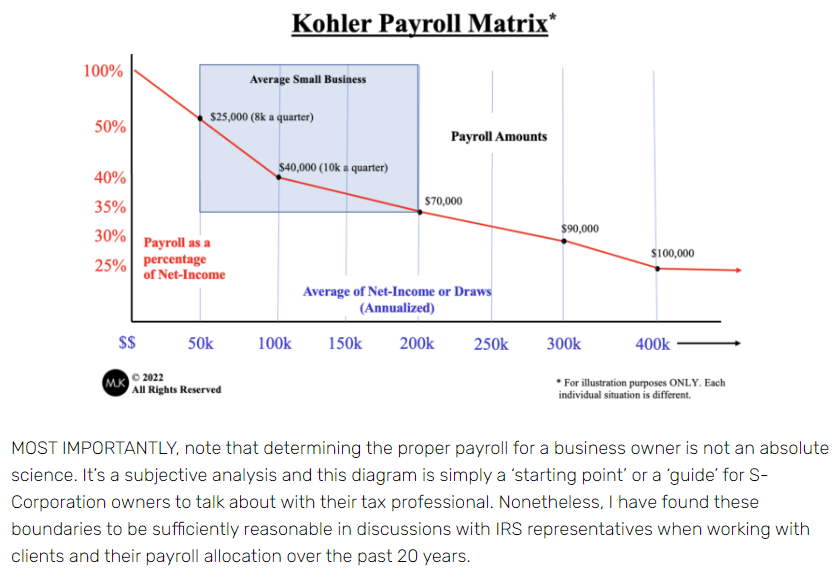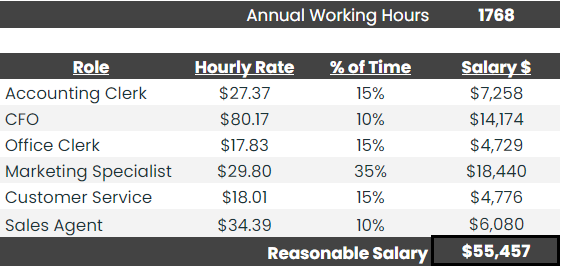SCFO #005: What Solopreneurs Need To Know About Paying Yourself With An S-Corp.
Read time: 3:44 minutes
In last week’s issue, we discussed why an S-Corp can save solopreneurs thousands in taxes in the right situation.
But we didn’t cover one important element.
How much do you need to pay yourself with an S-Corp?
Unfortunately, there are plenty of solopreneurs that set up their S-Corp and forget to cut themselves a paycheck.
And most don’t understand why you need to pay yourself in the first place.
The primary reason to pay yourself a W-2 salary from your S-Corp is that it’s legally required. Not doing so is a huge red flag to the IRS, and could trigger a surprise audit and unexpected tax bill.
By understanding why and how much you should pay yourself, you can avoid a headache down the line if the IRS ever comes knocking.
Here’s what you need to know to make sure you’re covered.
Why do I need to pay myself W-2 wages?
As a reminder from the previous issue, the value in an S-Corp is separating your profits into two different buckets:
Profits, and
W-2 Wages
Since profits are not subject to employment taxes, you are incentivized to keep your W-2 wages low.
The IRS is well aware of this incentive.
And they’ve contested it in several audits and court cases.
In court cases where S-Corp owners do not pay themselves a salary for services performed, the taxpayers lose and must re-categorize ALL of their profits to wages.
For example, if you made $100,000 and paid yourself $0 in W-2 wages, you’d be on the hook for $15,300 in employment taxes PLUS interest and penalties.
Ouch!
But in cases where owners did pay themselves a salary, the court instead focused on how much was a reasonable salary to pay the owner based on services performed.
This is where reasonable compensation comes into play.
What the heck is reasonable compensation?
If you remember one thing, remember that reasonable compensation is a requirement for S-Corp owners who provide substantial services to the business.
But what exactly is reasonable compensation?
The answer is not a one-size-fits-all solution.
It depends on the services the owner provides to the business and what a comparable market rate would be for those services.
Think of it like this - if you were to go out and hire someone to perform the same services you do in your business, how much would you pay them?
This is the starting point for determining a reasonable salary for yourself as the owner.
But it’s not as simple as just picking a number.
The IRS has guidelines in place to ensure owners don’t pay themselves a salary significantly lower than the market rate just to reduce their tax burden.
Here’s what you need to know when creating a reasonable salary for your business.
Reasonable Compensation → Simple Method
Most solopreneurs don’t want to spend time figuring out market rates for different services they perform in their business.
I know I don’t.
This is where the simple method can come into play as a starting point.
But first, know that this method won’t pass muster should the IRS contest your salary.
Why?
Because there is nothing to back up your salary.
Most CPAs suggesting this approach tend to target a salary in the range of 20-50% of the business’s income (before salary).
Generally, the higher the %, the lower your risk of getting challenged and losing.
For context on how to pick a %, below is an example from Mark J. Kohler, CPA (See the article here).
**Note: this approach is just a starting point. If the IRS were to challenge your salary, it’ll be hard to defend it with this approach. Be sure to sit down with a tax professional to decide on a salary that makes sense for you and your business.
Reasonable Compensation → Detailed Method
The final method provides a better defense if you are challenged, but it also takes more time.
Hence, why it’s called the detailed method.
For this method, you’ll generally take the cost approach, meaning figuring out how much you’d pay someone to perform the services you are performing.
Here are the steps you’d take to determine your reasonable salary:
Separate the different roles you perform in the business
Track hours for each of those roles
Determine an hourly rate for each role
Multiply your hourly rate by the hours worked for each role
Total it all up to determine your reasonable salary
When determining the hourly rate, note that you should also consider:
Market rates in your area, and
Your level of experience & training
The Bureau of Labor Statistics provides data for calculating this. You can also use the BLS site to run data by state to get specific on market rates in your area.
Below is an example of what this might look like when completed.
Even if you use the detailed method, it’s helpful to compare this to the ranges provided in the simple method to verify your compensation is reasonable at a high level.
If you’d rather someone else do this for you, discuss options with your CPA, or alternatively, you could use RCReports.com. As of this publishing, the cost for a reasonable compensation report is $500.
Final Thoughts
Understanding how to pay yourself with an S-Corp can seem daunting.
But after reading this article, you now know more than most people with an S-Corp.
As discussed, S-Corps require a reasonable salary. If you neglect to take one, you could end up in hot water with the IRS.
To figure out a reasonable salary, you can take a simple or detailed approach.
Each option has its pros and cons, with the detailed approach providing a more defensible position in case you’re ever audited.
Regardless of which option you choose, it’s best to discuss your particular situation with your CPA.
Additional Resources:
P.S. if you’re a solopreneur interested in keeping more of what you make on your journey to less hustle and more freedom, book a free 15-minute call today.
Stop wasting time DIY-ing and start focusing on growing. You didn’t sign up for solopreneurship only to get stuck managing your personal and business finances.

